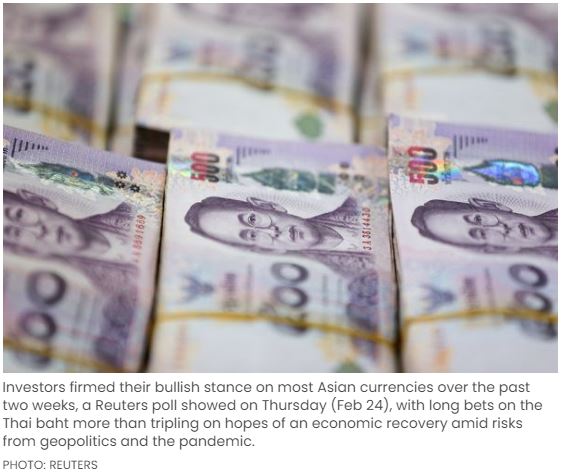Bullish bets on Asian currencies firm, Thai baht leads pack
[BANGKOK] Investors firmed their bullish stance on most Asian currencies over the past two weeks, a Reuters poll showed on Thursday (Feb 24), with long bets on the Thai baht more than tripling on hopes of an economic recovery amid risks from geopolitics and the pandemic.
The poll of 12 market participants showed long positions in the Thai baht were at their highest since the end of 2019, while bear positions in the Indonesian rupiah reversed and similar positions in the Korean won, Philippine peso, and the Indian rupee unwound significantly.
Thailand’s finance minister said all policies were directed towards achieving a 4 per cent economic growth this year and ensuring full recovery in 2024. Earlier this month, its central bank also left the benchmark interest rate at a record low for a 14th straight meeting.
“Thailand’s economic recovery remains uneven but will continue despite pandemic volatility,” said Chua Han Teng, economist at DBS Group.
Most regional units, however, faced headwinds this week from rising tensions between Russia and Ukraine. They took a beating further on Thursday after Russian forces launched a full-scale attack, firing missiles at several Ukrainian cities and landing troops in its south coast.
This poll was concluded before the attack.
Bullish bets on the Chinese yuan were maintained, with the currency hovering at a near 4-year high on Thursday as demand rose for less risky assets.
The yuan also appeared more resilient, compared with emerging market peers, on rising foreign capital inflows into Chinese assets and heavier corporate conversion of their export receipts into the yuan.
Analysts reversed their short positions on the Indonesian rupiah as South-east Asia’s largest economy booked a US$2 billion budget surplus in January, with tax revenues soaring through stronger economic recovery and high commodity prices.
The Asian currency positioning poll is focused on what analysts and fund managers believe are the current market positions in nine Asian emerging market currencies: the Chinese yuan, South Korean won, Singapore dollar, Indonesian rupiah, Taiwan dollar, Indian rupee, Philippine peso, Malaysian ringgit and the Thai baht.
The poll uses estimates of net long or short positions on a scale of minus 3 to plus 3. A score of plus 3 indicates the market is significantly long US dollars.
The figures include positions held through non-deliverable forwards (NDFs). REUTERS


 Thailand
Thailand




